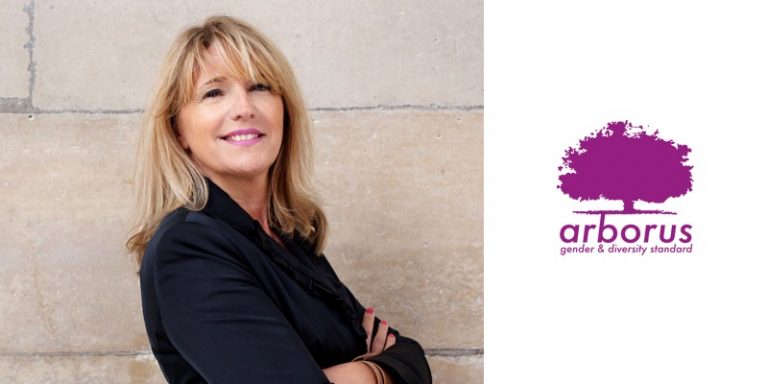
Arborus and Orange unveiled the International Charter for Inclusive Artificial Intelligence on April 21, 2020. One year later, all the partners and signatories of this Charter celebrated the first year of existence of this initiative. In this very special context, focus with Cristina Lunghi, founder of Arborus and pioneer of the creation of this international Charter, on Arborus, the Charter and artificial intelligence.
ActuIA: Can you present Arborus, its project/missions?
Cristina Lunghi: Founded in 1995, the Arborus Association works for gender equality and inclusion in the world of work on an international scale. In 2010, Arborus created an endowment fund to pilot the implementation of the first international label on professional equality, the GEEIS (Gender Equality European & International Standard).
Now present in 41 countries, GEEIS has become the reference label for CAC 40 companies (Carrefour, Danone, EDF, Keolis, Legrand, L’Oréal, Orange, Safran, Sodexo), as well as foreign companies (Metro, Inditex, Dubai Police) and SMEs (CAMFIL).
In 2019, Arborus launched the GEEIS-SDG Trophies at the United Nations to reward the actions carried out by companies that make equality the basis of their actions in favour of sustainable development.
In 2020, Arborus launched the first international charter for inclusive Artificial Intelligence (AI) in partnership with the Orange Group. This Charter aims to be a reference for all companies committed to equal opportunities. It aims to ensure that AI is designed, deployed and operated in a responsible and inclusive manner. This international charter, which is based on seven commitments, will create a framework of trust for individuals on how AI systems are designed and used. This is a groundbreaking project that is in line with international recommendations on women’s rights and equality.
ActuIA: In September 2020, Arborus launched the GEEIS-AI label, provided for by the Charter. Artificial Intelligence has been revolutionizing our society for several years. What are its impacts on gender equality and discrimination?
Cristina Lunghi: In the context of the health crisis, where AI has developed twice as fast as in normal times, it became clear to us last year that while AI is a formidable lever for development and progress in all areas, it can also become a real danger, particularly in the area that interests Arborus in particular, that of Human Capital.
A non-inclusive and non-accountable AI could accentuate discriminatory biases or create new ones. Several cases, such as those of Google and Amazon, have illustrated this recently. It is these risks to human resources that motivated the creation of this Charter, and then of the GEEIS-AI label, which completes our “gender and inclusion” audit system.
Indeed, Arborus has been working for 26 years on the subject of equal opportunities and we do not wish to see all our efforts reduced to nothing. A gender-neutral world would be a terrible step backwards. Our world urgently needs gender diversity and equality for more balanced and harmonious social relations.
ActuIA: We understand that Artificial Intelligence tends to reproduce and even exacerbate human failings. Just one year ago, Arborus and the Orange Group launched the International Charter for Inclusive Artificial Intelligence. What is your assessment?
Cristina Lunghi: AI is a tremendous lever for development and progress in all areas. The post-Covid-19 society offers the opportunity to create a more balanced world between women and men. To achieve this, we need to raise awareness and ensure an inclusive and responsible AI across the value chain and in all sectors of activity.
Arborus has demonstrated its strength of innovation and mobilization by bringing together public authorities, the economic world and civil society, in the service of a fair vision of the economy. We invite all companies to promote the values of the Charter and to pursue their commitment by obtaining the GEEIS-AI label.
Today we have almost 100 very committed signatories and our international perspectives will be deployed as soon as the end of the health crisis allows it.
Translated from Vers une intelligence artificielle inclusive et responsable : Trois questions à Cristina Lunghi d’Arborus









